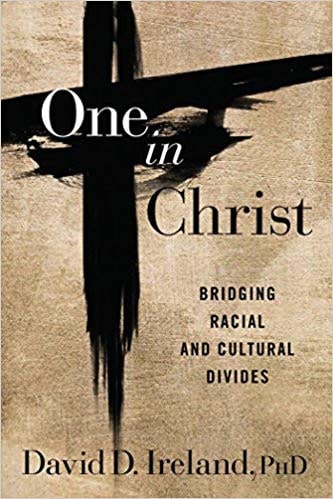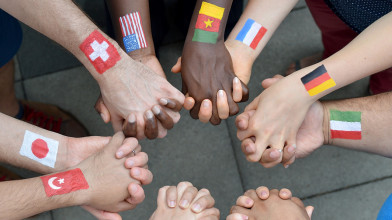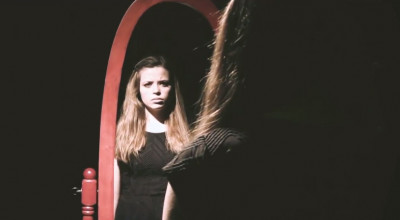Preview:
Dr. David Ireland: … I’ll use a phrase that… It’s not a cliché but it’s appropriate. White silence leads to black rage.
John Fuller: Hm. Well, we all need to consider talking more, learning more, and looking for opportunities to show God’s love and care for all people. We’re gonna talk about that today on Focus on the Family as Dr. David Ireland joins us again. Uh, your host is Focus president and author, Jim Daly, and I’m John Fuller.
End of Preview
Jim Daly: John, we had an excellent conversation last time with David, and I think his pastor’s heart was on display during our discussion. Um, some people may have been uncomfortable with it, we’re talking about racial issues, and that’s a good thing, to be open and honest, to try to find that way forward where we can live out the Christian faith in a strong way, and that is the title of David’s book, One in Christ. I believe that’s God’s heart for all of us, no matter the color of our skin. If we claim Christ, we’re one in Christ first and foremost. Everything else is really, uh, as David put it yesterday, it’s like the tossed salad. We’re all a little different but we’re all part of the meal, and I love that expression that he gave to us last time. Um, too often we’ve let issues of prejudice and diversity, uh, fall into that quagmire and divide us. And right now in our country, as I shared last time, I’m worried about that because the, the depths of the division, and the heights of the division are, in my mind, bigger than ever before, even though we’ve made quite a bit of progress over the last 30, 40 years in a very positive way. But it certainly has not been enough, and we’re gonna come back this time and talk further with Dr. David Ireland again with his book, One in Christ.
John: And it certainly seems like an appropriate topic this week as we celebrate the sanctity of all human life. Uh, contact us to get a copy of David’s book. Our number is 800, the letter A, and the word FAMILY, or you can find that at focusonthefamily.com/broadcast.
Jim: David, welcome back.
Dr. Ireland: Jim, thank you so much. John, good to see you again.
Jim: Now last time, people heard this, but you’re pastoring in New Jersey.
Dr. Ireland: Yes. I pastor Christ Church, a very diverse congregation, about 70 different nationalities that call Christ Church home.
John: Mm.
Jim: Almost 10,000 people.
Dr. Ireland: Yeah. And so busy, but, uh- (laughter)
John: Yeah, how’d you come out here to Colorado? How’d you make the time for that?
Dr. Ireland: I, I ran away. They didn’t even know I left. (laughter)
Jim: I’m sure they know you’re gone, let me tell you, but it is good to have you here. You’ve written this wonderful book, One in Christ. For those that didn’t hear the broadcast, or the podcast last time, just go back and listen to it.
John: Mm-hmm.
Jim: Contact us and John will give those details again. But, um, it, it really was a good, open discussion, and I’m so grateful for that because I think one of the core things that we need to do is to be able to communicate with each other and share our real feelings. You know, so much of those real feelings now are hidden because of political correctness.
John: Mm.
Jim: People don’t feel like I can actually say what I’m thinking, and that’s a dangerous place to be for everybody. I don’t care the color of your skin, but if we can’t talk openly about what we’re feeling, we’re not gonna make progress, right?
Dr. Ireland: Absolutely. In fact, I appreciate you guys and Focus hosting this kind of conversation, and it has national implications. I always try to tell people that when someone is vulnerable with you on a tender topic, look at that as a privilege.
Jim: Huh.
Dr. Ireland: Don’t allow their naivete, or their myths to hinder you-
Jim: Yeah.
Dr. Ireland: From being able to have very pointed conversation. It… You should become a safe person, particularly the Christian community, when we’ve been charged by Jesus Himself to love your neighbor as you love yourself, which suggests then that you need to have this thick skin, and a big heart so you can be able to allow people-
Jim: Mm.
Dr. Ireland: To come around you and say what they need to say-
Jim: Yeah.
Dr. Ireland: And not walk on eggshells on tender topics like diversity and race.
Jim: You know, one of the things that I found so helpful… And I did the international work here at Focus for a long time. I traveled to about 70 countries, so I got a good taste of the world, and, uh, in a good way, meeting the Christians from around this world. And humor helps, and humor is universal. I mean, not every joke flies but generally, people get it, and I’ll never forget being in Kenya with Dr. Lillian Mahomey, it was one of the early trips, 1992, ’93, right in that range, and I met with her. She was a psychologist there in Kenya, and we’re having lunch, and I said, “You know, Lillian, what we have to share at Focus on the Family about marriage and parenting, is that gonna be applicable and important to people here in Kenya?” And she looked at me with a smile on her face, she said, “Oh, Jim. It’s just like an American to think you invented the family.” (laughter) And I love that line.
Dr. Ireland: Yeah.
Jim: It was such a smart line. And I said, “Oh, Lillian, I’m sorry, but will it touch a heart here?” And she said, “Absolutely. People here have marital problems, we have parenting issues just like you do in the US. In fact, it is the universal language.” Wow!
Dr. Ireland: And, and I appreciate that ’cause I guess I have a similar background in that I’ve spoken in some 75 countries, you know, of the world and every country, when you go there, they want to know that you love them. And when you have that kind of platform, then they open their hearts to you.
Jim: Yeah.
Dr. Ireland: You know, in fact, I was in Zambia, and I… First time speaking there in this South-Central African country, and when I spoke, people felt so close to me. And then I asked the host, “Why do I feel that they’re close to me?”
Jim: Mm.
Dr. Ireland: And, and he said, “Because you’re an American and they think you’re gonna hurt them.”
John: Mm.
Dr. Ireland: And so when I changed… You know, I opened my heart, and they opened theirs, there was this receptivity.
Jim: Yeah. You know, David, I want to get into the meat of the book and be able to express to the folks what you’ve written, and hopefully, uh, they’ll be motivated to get a copy of the book. That’s what I hope, uh, because there… It’s jam packed with good things for us to consider and to think about. One of the things you mention in there, um, in kind of a rebuttal to those that say, “Hey, we’ve made great strides, uh, political correctness and tolerance have provided, you know, kind of an avenue for us to move forward.” But you kind of disagree with that. What is the downside of political correctness and tolerance?
Dr. Ireland: Tolerance particularly is that it’s negative. There’s nothing positive about tolerance. What I-
Jim: Now, I- I’m just going, “Really? What? That doesn’t even sound right.”
John: That’s countercultural. Yeah.
Jim: Tell me why.
Dr. Ireland: Because when someone tolerates you, they put up with you. (laughter) You’re not… You’re not…
John: Hm.
Dr. Ireland: You’re not their preference. Y- you’re not-
Jim: You tolerate your teenagers. (laughter)
Dr. Ireland: And, and, and sometimes they feel tolerated, and, and so what I do with people, particularly when it comes to diversity, is that I say, “Don’t tolerate, accommodate.”
Jim: Huh.
Dr. Ireland: And I gave the example of the generalization of how men and women, we shop differently, and so when I got married, uh, way before the flood. (laughter) I’ve been married 35 years. The Noahic flood. But my wife said, “Honey, let’s go to the mall. I want to buy a pair of blue shoes.” I said, “Sure.”
Jim: You said what?
Dr. Ireland: So, (laughter) so I figured… I figured she’s gonna-
John: That’s true love.
Dr. Ireland: Shop the way I shopped. You know, men are… You know, when we shop, we go on a hunt.
Jim: Right.
Dr. Ireland: When women shop, they’re on a safari. (laughter) And so she took me to the… To the mall, and we’re shopping and she went to one shoe store, she put it on, it fit perfectly, the price was right. I said, “Let’s get it.” She said, “No.”
John: Yeah, we’re done. Yeah.
Dr. Ireland: We went to another s- shoe store at the other end of the mall. By the time it was all over, went to like, six shoe stores. I was livid, (laughter) and, and, and I said, “I can’t do this anymore. It’s not right.” I said, “You need to shop the way I shop, be a hunter.” And… But when I matured as a husband, I learned then to be accommodating, and accommodating means that since her style’s different than mine… Her style’s not worse or better than, it’s different. So when we go to the store now, I take a book with me so I don’t make her feel rushed, I don’t make her feel pressured, I don’t make her feel as if, you know, her style is not good. And so what that has done is broadened this level of acceptance from me towards her, and a greater level of intimacy in our relationship. I take that same principle to the area of diversity. When you practice accommodation with someone, whether they have different music taste, or they may have a different food dish. I remember when this Asian American said to me, “I don’t like eating with Americans” And he’s second generation, “because they look down their noses at the Asian foods, and so, I’m uncomfortable eating with Americans.”
John: Mm.
Dr. Ireland: And he said that very vulnerable to me, which meant he didn’t want anyone to say when he’s ordering his dish, “Ew, like how could you eat that?” (laughter) And so accommodations. See, tolerance is when I say, “Ew, how could you eat that?” Accommodation says that, you know, “What other dishes do you eat, and help me, you know, have a taste of that.
Jim: Having an interest, yeah.
John: Why do you like that?
Dr. Ireland: Yeah. “May I have a taste of that?” And-
Jim: Mm.
Dr. Ireland: You know, that type of thing. So it creates a bigness in your heart.
Jim: Yeah.
Dr. Ireland: Accommodation says, “Let me mature.” Accommodation says, “There are more styles other than mine, and mine is not the preferred, or the only.”
Jim: Yeah. And that’s good, it’s a good way to look at it, having an interest in others.
Dr. Ireland: Sure.
Jim: I mean, that’s really… And I think that’s the heart of God. He wants us to have that interest in others, and from that comes empathy, and, you know, support emotionally in that way. A- another big controversial issue, um, the whole statue, and the flag, the Confederate flag thing, and everybody’s gonna have, um, you know, motivation on this one. You know, “It’s part of our history. Why are we trying to destroy the history?” It may not be a great part of our history, but it’s still part of our history, so why allow people to go into a park and, you know, knock down a statue of some Confederate Army representative. Uh, what… The other side is, “Hey, this is offensive.” I want to get both sides, you know, that’s a part of our history that isn’t a very positive thing at all, and we want to eliminate that, and I don’t understand why the white community doesn’t support us eliminating these statues that represent racism in the park. So, hopefully I’ve given both sides fairly.
Dr. Ireland: Uh, you have. I, I like the idea of what some cities have taken the approach. They created a commission that was very cross cultural, very diverse, and they allowed that commission then to look at the individual statues that were being brought into question. And so, I think through the lens of diversity, we can arrive at something that’s gonna be fair because I don’t like the idea of having a revisionist history in areas that’s unnecessary, and in the same breath, when there’s blatant abuse, then that’s also wrong. I, I hope I’m not sounding political. What I am saying is that when there’s specific statues looked upon through a multi-cultural lens, then the decision becomes one that’s good for the community.
Jim: Hm.
Dr. Ireland: And I think that’s the approach that many cities have taken, and I applaud them for that.
Jim: No, and that’s a good… I think a good middle ground, you know? This is accommodation in the best sense, correct?
Dr. Ireland: Absolutely.
Jim: Yeah. Uh, David, in fact, uh, Alex was a story you mention in your book, an Asian man who had some difficulty with his kids playing with other nationalities. Describe that. And again, I think the reason I want you to touch on this story is if we remove kind of all the, the peels of the onion, many people think this way, and that’s what will touch our hearts.
Dr. Ireland: I remember I was looking for stories and Alex was a Chinese man in my congregation. And I asked Alex, I said, “Alex, tell me your story about diversity.” And he says… When… The moment I said that, his eyes welled up with tears. He said years ago, about 25 years ago, when his children were small, that they were playing with different kids, there were Blacks, whites, and the neighbors were saying to Alex, “Why are you allowing your kids to play with those other kids?”
John: Hm.
Dr. Ireland: And then, so he got angry. He said, “Why are you playing with those other kids? You play with Chinese kids.” And his kid said something to him. He said, “Daddy, you taught us that Jesus calls us to love people.”
Jim: Huh.
Dr. Ireland: And when his children said that to them, he started weeping because he realized that there’s a conflict in his heart in terms of his Christian faith, and his worldview in regards to diversity.
Jim: That is a great point, David, and I, I think it catches me because in Southern Cal, I lived in some pretty diverse neighborhoods. I, I lived in third and fourth grade in Compton, very diverse at the time, Latino, African American obviously, and fewer white, uh, families. But why do kids get it and adults don’t? You’d think it would work the other way around, that as you mature in life, you gain wisdom, you would better understand this, but it’s, it’s almost the inverse, that children, by their very nature, are much more open to one another than adults, so what’s happening as we grow that makes us brittle?
Dr. Ireland: We grow, we hear stories, we experience things, we experience victimization, and pain, we experience rejection, and so it then causes us to become more and more entrenched in place of safety, and place of safety is almost a monolithic, a monocultural lifestyle.
John: Hm.
Jim: It’s a human, uh, thing-
Dr. Ireland: Yeah.
Jim: To, to run to safety and to exclude others at that point.
Dr. Ireland: Correct, and in that monocultural setting, which is very devastating, not only from a business perspective when you look at it through the lens of organizations, or even a church perspective, it limits you from growth.
Jim: Yeah.
Dr. Ireland: It limits you from becoming a full human being.
Jim: Mm.
Dr. Ireland: It limits you from maturing into your full potential.
Jim: Mm.
Dr. Ireland: You know, and so there’s a lot of limits that occurs, and most people don’t realize that. And when we look at it on a practical level, the way we know when we’re cross cultural and diverse is that people that are a different race, ethnicity, culture come up to you and they feel safe to talk to you about things that may have happened to them-
Jim: Wow.
Dr. Ireland: That may be racial, cultural, and ethnic.
John: Mm.
Jim: Man, you think of the Lord’s words, that He came to set us free.
John: Yeah.
Dr. Ireland: Yeah.
Jim: That’s a way to apply them right in this space.
Dr. Ireland: Absolutely.
Jim: He came to set us free from those, those burdens.
Dr. Ireland: Absolutely.
John: And Alex demonstrated that when he said, “Oh, I have a… I have a problem here.” And he bent his own worldview to adapt to Scripture. He let God shape his worldview, and it sounds like it was a really transformative moment.
Dr. Ireland: And he had… And he had to also stand up to the support of his now Christian worldview-
John: Mm.
Dr. Ireland: With his neighbors that were Chinese.
John: Yeah.
Dr. Ireland: So where the rubber hits the road is then how do we act in public when we’re dealing with diversity? Is diversity something private, in the back room, or is diversity in the public?
Jim: Mm-hmm. Yeah.
John: Well, we’re calling you to consider some hard things on this Focus on the Family broadcast, um, but we have a great guide, Dr. David Ireland, and he’s written a terrific book, One in Christ: Bridging Racial and Cultural Divides. We’ve got the book and the CD or download of this conversation, and other resources at focusonthefamily.com/broadcast, or call 1-800, the letter A, and the word FAMILY. 800-232-6459.
Jim: David, um, this is the last part of the program, the last quarter. We’ve done yesterday and today, and I want to make sure the listeners know your story because I think we’ve heard you, Dr. David Ireland. I mean, the pastor of church in New Jersey, and there’s so much more to your story. You’re eight years old when your mom and dad came to this country. Pick it up there as an eight-year-old, you have a pretty well-formed opinion, it’s… You know, eight, you know what’s going on. What was that like? You moved to New York.
Dr. Ireland: I moved to New York. I came from that small island nation of Jamaica. I didn’t understand anything about race, diversity, prejudice, none of those things, and my family bought this house in a small little community called Rosedale, Queens, out of New York. And within two weeks of us living there, the house was firebombed. You know, the… A Molotov cocktail was thrown into the rear bedroom window and exploded-
Jim: Your bedroom.
Dr. Ireland: Yes, my bedroom. I was actually in the bedroom at the time, and-
Jim: Mm.
Dr. Ireland: Saw this explosion.
Jim: Wow, that had to be horrific.
Dr. Ireland: It was, and it was six white teenage boys that threw a Molotov cocktail there to, you know, try to blow us up. Uh, the house was damaged but no one in the house was damaged, and what was more upsetting though is that we had to have round the clock police surveillance for six months because of the death threats that followed.
Jim: My goodness.
Dr. Ireland: And, and so it was very painful, but… And I didn’t understand. I didn’t understand the issue of… I, I didn’t know there was anything such as prejudice. I had no idea, so it was so foreign to me. “Why am I hated? Why am I disliked?” And then when I became a Christ follower, it was July 6, 1982, Jim, at 10:00 pm.
Jim: What age?
Dr. Ireland: Yeah, I was 20 years old at the time.
Jim: Okay.
Dr. Ireland: And when I became a, a follower of Jesus, He challenged me to open up my heart, not only to forgive others that have victimized me, but to ask God to forgive me for my own sins. And when I did that, something happened in my heart where I started to love people that were so different than myself that, you know, the thought of being victimized never even entered my mind. What I did understand is that all things work together for good to them who love God-
Jim: Hm.
Dr. Ireland: And are called according to His purpose-
Jim: Yeah.
Dr. Ireland: Even firebombing incident. And so, I have a basis now, when I talk to whites, Blacks, Asians, you know, Latinos, I can come from whatever angle they want me to come from.
Jim: Right.
Dr. Ireland: The pain of victimization or the success of shepherding a church that’s very diverse, so whatever angle. And so that platform, it helps me to connect with people.
Jim: You know, a- and I want to know more of this story. I mean, you went through that pretty quickly, you know, and you came to the end where it worked for your good, and that’s all wonderful but what were the answers to those questions you, you… When you’re 9, 10, 11-
Dr. Ireland: Uh, I-
Jim: And people are treating you in such a harsh way? How did your mom and dad, the adults in the story-
Dr. Ireland: My, my parents were so… They were so wise that, uh, they shielded us. There were four Ireland children, they shielded us children from this. In fact, we had a above ground pool that they told us one year, “Let’s take out the pool.” And I didn’t find out the reason why we took out the pool until I was an adult, and I was… In this book, One in Christ, I… In fact, I even have some of the letters in there that my mother hid from me as a child, letters that neighbors were sending, hostile letters, death threats that, uh-
Jim: Oh, man.
Dr. Ireland: That that revealed. She said… And they said the reason why they, they told us to take out the pool is ’cause they were afraid that people were gonna throw acid in the pools and when the children went in there to swim, that we would get burned.
Jim: Oh.
Dr. Ireland: So they took up this pool, got rid of the pool, and I’m bemoaning the fact, and they shielded us from it.
Jim: Right.
Dr. Ireland: They didn’t want our hearts to get junked up with prejudice-
Jim: Wow.
Dr. Ireland: So they never told us the reason. The book was written f-… With someone who has an ax to grind. The book is written for someone who walks through 75 nations of the world talking to people, no matter what their race and ethnicity is, so to speak, to help them get healing, and to help them come to a place where they can be mature-
Jim: Yeah.
Dr. Ireland: And feel free, in terms of diversity. And so that story is a-
Jim: Yeah.
Dr. Ireland: Is… You know, and I know I raced through it, but-
Jim: No, no. I didn’t mean… Yeah, but it-
Dr. Ireland: That story… That, that story is, uh… Is very helpful on many levels.
Jim: But it connects, it connects with people. And in fact, the teenagers who did that were never brought to justice, right?
Dr. Ireland: They were caught but they were never punished. The judge simply said, “This is just a childhood prank. Let them go.”
Jim: Wow, that is unbelievable.
John: A- and David, I mean, I want to understand. So your parents did their best to shield you, but you had to have a growing awareness of what was going on. It… I mean, did, did you have points in time when you thought, “This is wrong? We’re just us, we’re not a threat.”
Dr. Ireland: Well, it was. I mean, not only that, I mean, there’s so many documentaries that was produced on Rosedale, Queens. It was so bad that-
Jim: Mm.
Dr. Ireland: If a white family sold their house to an African American family, where that white family moved to would be bombed, as well as the house that was sold.
Jim: Mm.
Dr. Ireland: That kind of pact was established in some of the-
Jim: Mm.
Dr. Ireland: More visceral kinds of whites that had that perspective. So, it was very, very, you know, tenuous in terms of the environment, but I, I… When looking back, my heart didn’t get junked up, and I’m thankful to both my parents and to God for preserving me because-
Jim: Hm.
Dr. Ireland: Prejudice… I always say prejudice is everyone’s problem. Reconciliation must become everyone’s responsibility.
Jim: Well, it’s a great statement. Uh, in addition to that element, uh, forgiveness is a big part of it, right? Did… And you said you understood when you accepted Christ at 20 that we’re all sinners saved by grace, and it sounds like you applied it, even to your childhood, and the trauma that you had, and the people that mistreated you for a lot of people. And, again, I don’t care what your skin color is, that’s a hard thing to do when you receive harsh treatment from someone and it’s unfair, it’s easy for our flesh, for our heart to respond very negatively to that. Um, forgiveness is a core part of your book, and how do we do that in a racial context? How do we move toward forgiving people for saying things, doing things? I mean, that kind of a pact you described is breathtaking to me. I didn’t grow up in that kind of environment. That’s unbelievable.
Dr. Ireland: Forgiveness is very important, and it’s necessary, and I mentioned in yesterday’s broadcast that free workbook that I want to just repeat again for the audience, if you go to the website oneinchristbook.com, that’s oneinchristbook.com-
John: And we’ll link to it.
Dr. Ireland: Yeah. When you go there, I take you through this workbook that helps you to practice and experience forgiveness, so there’s a personal side of it, where it’s a private… Where you’re reflecting, and there’s exercises. But it’s also a group workbook, and so you can take a group through it as well. The idea is that if you don’t get free through forgiveness… ‘Cause that’s what forgiveness means, it means to let go. The imagery is of a bird that’s in a cage. When you open the door of the cage and you let the bird out, that bird has experienced forgiveness. When you don’t forgive the people that may have hurt you, you yourself are imprisoned, you are enslaved to the pain. They have gone on, they’re living their life. They’re not even thinking about you, but you are bound. And so when you forgive them for the victimization, as traumatic as that may be, and I realize it is, you find yourself being free. Dr. Gordon Allport wrote a tremendous book called The Nature of Prejudice. In it, this Harvard sociologist outlined that there’s six levels of prejudice. The first level is when you simply distance yourself from people that are different than you. The sixth level is when you go through ethnic cleansing. And so, that is a wide array, and some people say, “Well, I’m not prejudice.” And if I look at your friendship base and there’s a disconnect, oh yes you are. Mild level, level number one, but it’s still prejudice, none the same.
Jim: Huh. Yeah, and we should all be mindful of that, as you’ve mentioned.
Dr. Ireland: Absolutely.
Jim: Um, in that area of forgiveness, um, probably one of the most recent acts of violence, of course, was Charleston, South Carolina, where that man… Young man went into that church, a Bible study midweek and basically assassinated a number of people. You include that story in your book. Describe it for maybe the handful of people that can’t remember it or don’t know it, what happened?
Dr. Ireland: Uh, Dylann Roof went in there on a Wednesday night Bible study, I believe it was a Wednesday night Bible study and just killed the individuals that were there in this prayer meeting, Bible study. But the point I bring out more than anything was the fact that one of the women that lost her mom, she, as a devout Christian, says, “I forgive him.”
Jim: Yeah.
Dr. Ireland: And those words, that’s ringed loudly to me, to know that my mother’s pulled from my life because of this victimizer, but yet because I still believe in the gospel message of forgiveness, I’m going to forgive Dylann-
Jim: Mm.
Dr. Ireland: For what he did.
Jim: That is a God thing.
John: Yes.
Jim: That is not something that a human being can do on their own power, um-
Dr. Ireland: It cannot, and there was a similar story in South Africa in the post-Apartheid, when they were going through the whole reconciliation meeting-
Jim: Yeah.
Dr. Ireland: I remember one of the officers that worked, you know, against the Blacks there in Africa… In South Africa, one of the Afrikaners, to get punished. The woman that he had killed her son said, “I don’t have any children any longer, but I have love in my heart as a mother. I would like the opportunity to love this police officer as a mom.”
Jim: Wow. Mm.
Dr. Ireland: That was a demonstration-
Jim: Yeah.
Dr. Ireland: Of the forgiveness that only Christ could put in someone’s life and heart-
John: Yeah.
Dr. Ireland: And that’s why I challenge people, that if you want to be a modeler of reconciliation… Just like there’s six levels of prejudice, let’s look at six levels of reconciliation, you become one of the most tremendous modelers of reconciliation so we can transform society.
Jim: Yes. I like it. In fact, let’s end there, ’cause it’s such a good story, the Navajo woman that you have in the book. I think this is such a beautiful illustration, and in her simplicity, she lands a sledgehammer of reality-
John: Mm.
Jim: And spiritual rightness. Tell that story.
Dr. Ireland: This gentleman was finishing up his dissertations, doctoral dissertation, on something that’s dealing with the Navajo Indian tribe, and when he went to live among the Navajo on their tribal area, the family that he… That was hosting him, there was an elderly grandmother that she… Her English was very broken, very limited. But somehow, they built a, a rapport, and this gentleman’s white. As they built a rapport with one another, and they had limited words exchanged, but it was a heart that was connected.
Jim: They ate meals together, and all that-
Dr. Ireland: Sure.
Jim: So they connected.
Dr. Ireland: Absolutely. And then at the end, when he was about to go back to school, they threw a party for him. On the way out to his car after the party, the elderly grandmother ran out, and she stood there in front of this gentleman, and she put her hands on his cheeks, and looked him in the eye. And in her limited English, she said to him, “I like me best when I’m with you.”
Jim: Mm.
Dr. Ireland: To say in this environment of diversity we’ve created for this bit of time, you pulled out qualities in me that I never saw before in me, so she said, “I like me best when I’m with you.”
Jim: Well, I think every one of you know exactly why we invited Dr. David Ireland to be with us, uh, these last couple of days, to have this discussion. So insightful, um, so correct, so, uh, spiritually on point, and, uh, I so appreciate you being with us, David. Thank you.
Dr. Ireland: Thank you, Jim.
Jim: And I hope, uh, you’ll contact us to get a copy of David’s book, One in Christ: Bridging Racial and Cultural Divides, and, uh, you know, make a gift of any amount and we’ll get this book to you as our way of saying thank you. If you can’t afford it, don’t worry about it. Others will cover the cost, I’m quite certain so just let us know and we’ll send this out to you, um, to help you along this journey of better understanding people who are different from you.
John: We really would love to hear from you, and if you can, please donate generously to Focus on the Family. Our number is 800, the letter A, and the word FAMILY. 800-232-6459, or stop by focusonthefamily.com/broadcast. Coming up tomorrow, Dave and Ashley Willis offer encouragement to husbands and wives.
Dave Willis: One of the greatest gifts you can give your kids is to model for them what marriage should be, and to give them the security that comes from seeing a mom and a dad in a loving relationship with God, and in a loving relationship with one another.

























